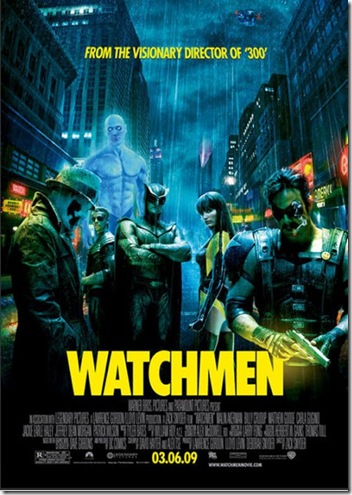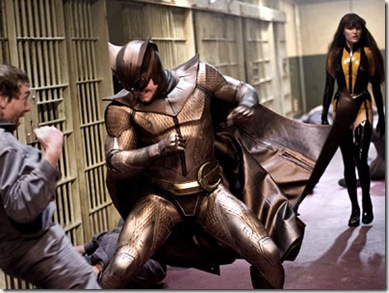The world of Watchmen is one where an actual superman is the lone deterrent to nuclear war. Too bad he doesn’t care. The world of Watchmen is one where a retired superhero can become worth three times the net worth of the major automakers – combined – by selling a line of superhero-related items – and using that platform to get into energy, cosmetics and anything else that comes to mind. It’s a world where the U.S. won the war in Vietnam in days – and where costumed heroes are a part of the national fabric. Watchmen contains multitudes.
It’s been just over a year since I last read the graphic novel by Alan Moore and Dave Gibbons – though I’ve read it at least once a year since the original mini-series came out. Even so, I was hoping to have set my memories of that graphic novel aside so I could experience something new in the Zack Snyder film. Considering how much of the graphic novel remained with me – and how faithfully Snyder has adapted the piece – and we’re talking down to minutiae – I was pleased to discover that that’s exactly what happened.
Watchmen is a revelation on several levels. It is a believable enough world that we can buy into the existence of costumed heroes and villains [though we might not be sure which is which] as a real part of American history; we can believe that, by winning the war in Viet Nam, [and with judicious use of a certain “mask”] Richard Nixon [Robert Wisden] was able to finesse the repeal of term limits and was in his fifth term as President of the United States; we can even accept that a nuclear accident turned one solitary man into a genuinely super being.
Oddly enough, like the graphic novel, the film also manages to make it believable that the two most psychotic characters would be the first to piece together the villain’s plot – and be prepared to die for it. In Watchmen, integrity is found in the strangest places – just as arguments for and against the slaughter of millions to ensure world peace for billions is given just as much weight in this alternate reality as has been in the real world.
This world is one where Superman doesn’t care and Batman could use a shot of Cialis. It’s a world where one costumed hero tries to rape another. It’s a world where even superheroes can’t slow the inevitable march of the Doomsday Clock – and where at least one of them doesn’t see that as a bad thing. In short, Watchmen is a film about the conflict between ethics and pragmatism; between order and chaos; givers and takers of life.
Watchmen is beautiful and brutal. It is an experience. Snyder has put together a thoughtful, nearly anthemic work here. There are various small changes and one major one [the pan-dimensional, intergalactic space squid is not here – and that’s a good thing] in the film, but the essentials are intact: the politics, the hovering of Armageddon, the nature of the characters, and the philosophical foundations for all of the above.
While Watchmen may not make stars out of its cast [Malin Akerman, Billy Crudup, Matthew Goode, Carla Gugino, Jackie Earle Haley, Jeffrey Dean Morgan, Patrick Wilson], it does allow them to shine. And the parts of New York that were used in the graphic novel are virtually exactly re-created [except where changes have been made to make them more cinematic]. As for the film as a whole, Snyder does a terrific job of balancing/juggling all the timelines without losing the pacing required to make us buy into its intricacies.
Watchmen isn’t perfect, but it’s incredibly ambitious [as was the graphic novel] and adventurous in ways that we’ve not seen in many films of any genre. Its deconstruction of the superhero genre comes through intact – and that’s probably more than anyone was expecting. It is a film that will hold up to multiple screenings and I can’t wait to hear the commentary track on the DVD [there had better be one!]. Now I have to see it in IMAX!
Final Grade: A

